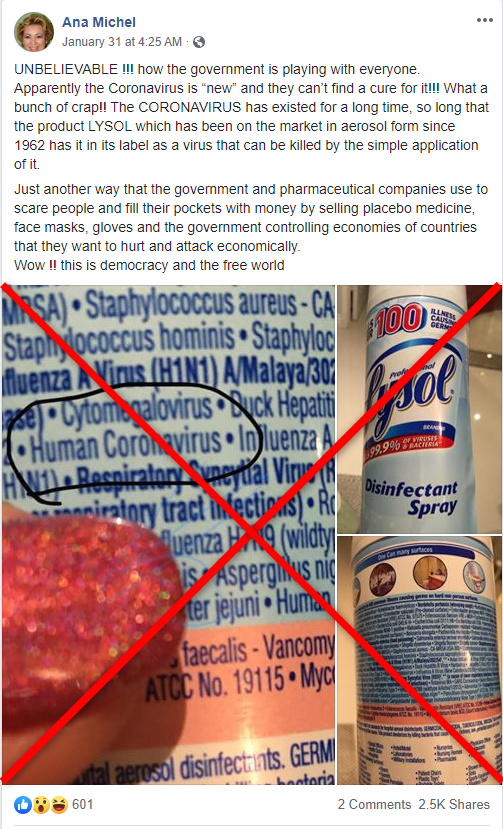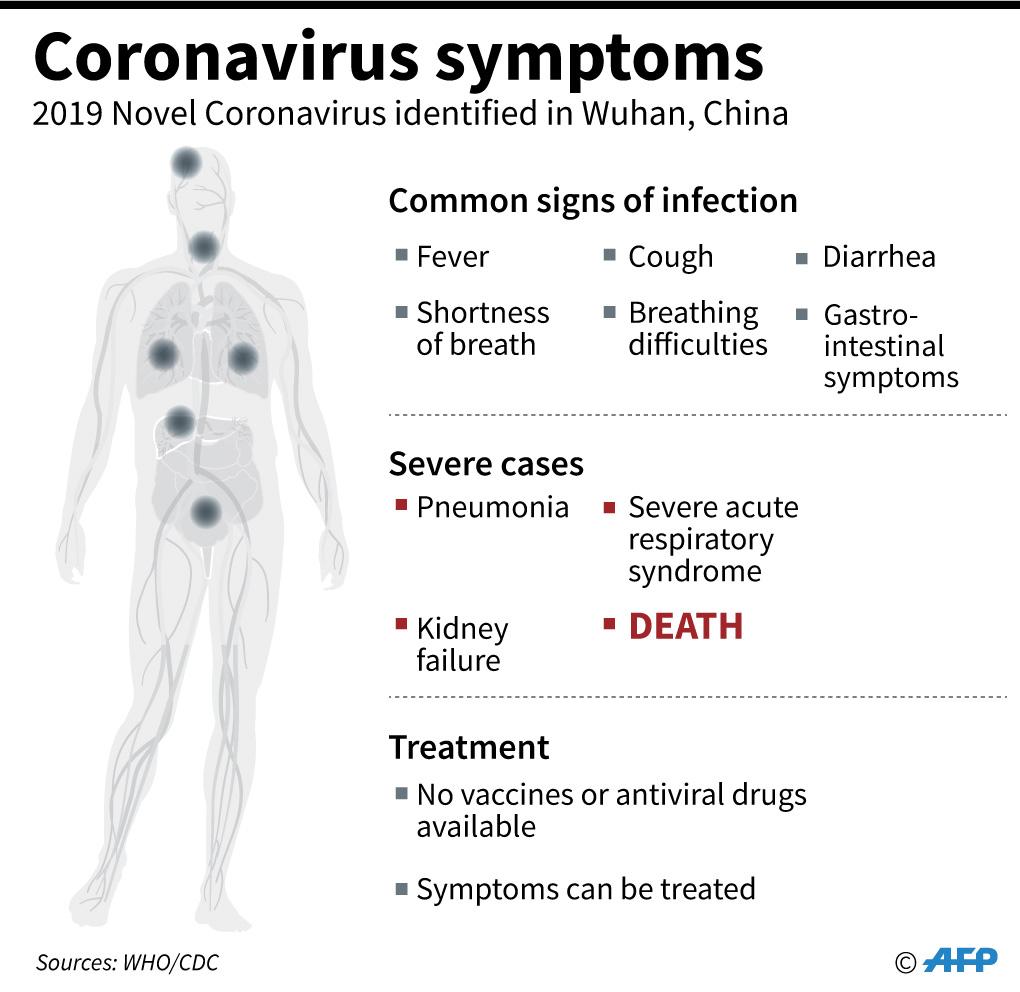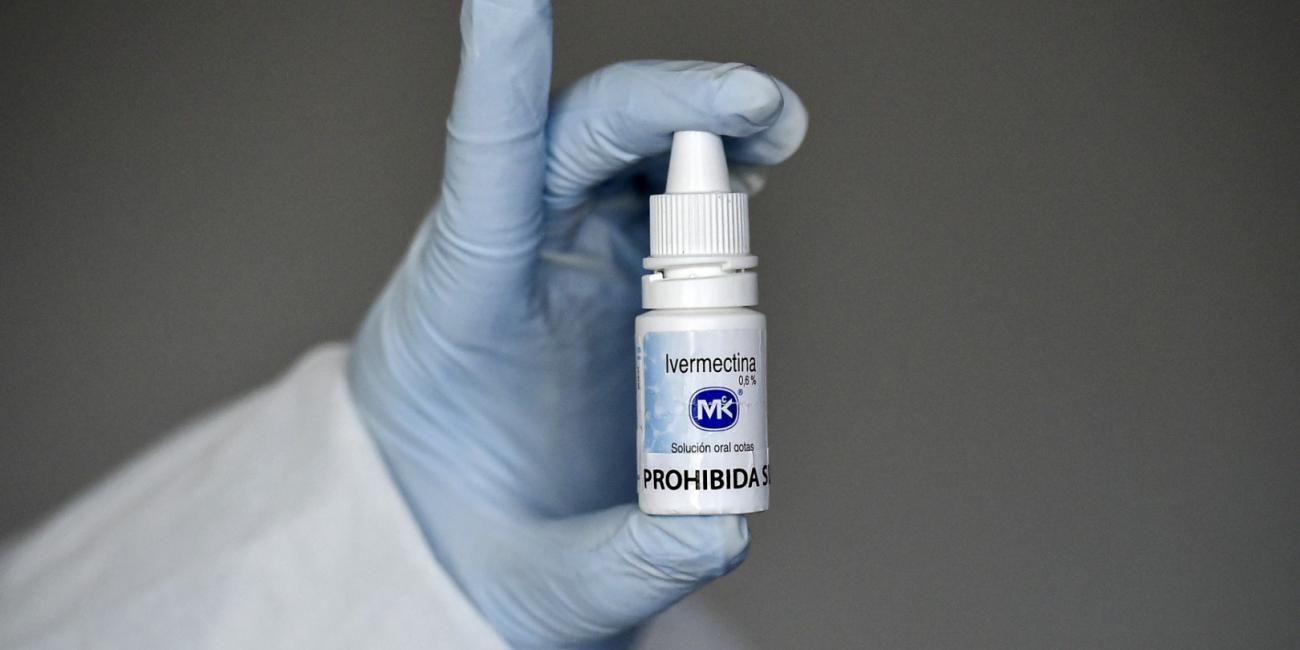
Lysol product labels are not evidence of a novel coronavirus conspiracy
- This article is more than six years old.
- Published on February 8, 2020 at 12:29
- Updated on September 2, 2020 at 19:33
- 3 min read
- By , AFP USA, Manon JACOB
“UNBELIEVABLE !!! how the government is playing with everyone. Apparently the Coronavirus is ‘new’ and they can’t find a cure for it!!!,” a post shared 2,500 times on Facebook claims. “The CORONAVIRUS has existed for a long time, so long that the product LYSOL which has been on the market in aerosol form since 1962 has it in its label as a virus that can be killed by the simple application of it.”
The post includes several close-ups of the brand’s disinfectant spray, including one of the back of the bottle and its label, with the mention “Human Coronavirus” circled.
“Just another way that the government and pharmaceutical companies use to scare people and fill their pockets with money by selling placebo medicine, face masks, gloves and the government controlling economies of countries that they want to hurt and attack economically,” the post says.

Similar posts have been shared here, here and here on Facebook, as well as here on Twitter, and here on Instagram. The same claim has also been made in Spanish here and here.
But these claims are misleading.
“Coronaviruses are a large family of viruses,” the Centers for Disease Control and Prevention (CDC) says on its website. “The virus causing coronavirus disease 2019 (COVID-19), is not the same as the coronaviruses that commonly circulate among humans and cause mild illness, like the common cold.”
The novel coronavirus is a new strain, also known as SARS-CoV-2, that was first reported in the Chinese city of Wuhan in December 2019.
On July 6, 2020 the US Environmental Protection Agency (EPA) announced the approval of two Lysol products, based on laboratory testing, as effective in killing SARS-CoV-2 on surfaces.
Lysol products had already been tested against older strains of coronaviruses prior to the COVID-19 outbreak, confirmed Reckitt Benckiser, the manufacturer of the disinfectants.
“To clarify, human coronavirus refers to the family of coronaviruses, hence why our labels referred to this before SARS-CoV-2 was discovered,” the company told AFP by email.
In a statement released on May 27 the company cited data published by the American Journal of Infection Control which, it said, confirms the active ingredients in Dettol and Lysol “are effective in breaking the chain of infection of COVID-19.”
This was the first published assessment of its kind, the company said.
In February 2020, Reckitt Benckiser told AFP it was “aware of the speculations about Lysol” but did not have access to the new virus for testing and was “not yet in a position to confirm levels of effectiveness against the new strain.”
AFP Fact Check has debunked similar claims circulating about Dettol, another Reckitt Benckiser product.

As of July 14, COVID-19 infections totalled more than 13 million across the world, with more than half in the United States and Latin America. The United States is the worst-hit country with 3,364,918 cases and 135,635 deaths, so far.
The US Centers for Disease Control and Prevention (CDC) notes the danger of asymptomatic transmission of the new coronavirus and recommends cloth face coverings when around others. The organization also recommends people wash their hands often, clean surfaces regularly, cover their coughs and sneezes, and avoid close contact.
AFP Fact Check has debunked more than 560 myths and other misinformation about the new coronavirus. The full list can be read here.
UPDATE: This post was updated on July 14, 2020 to add detail from the EPA and the company.
Copyright © AFP 2017-2026. Any commercial use of this content requires a subscription. Click here to find out more.
Is there content that you would like AFP to fact-check? Get in touch.
Contact us




